
Wednesday, 16 July 2014
Distance 19 km
Duration 3 hours 55 minutes
Ascent 77 m, descent 77 m
Map 139 of the TOP100 lime-green series
It was a beautiful clear morning when we crawled out of the tent, and our first breakfast of apricots and muesli was soon dispatched.
At the gate of the camping ground we paid what we owed to our genial host who, true to his word, was up and about early, and five minutes later, after a visit to the boulangerie, we sat down gratefully at la Civette for our second breakfast.
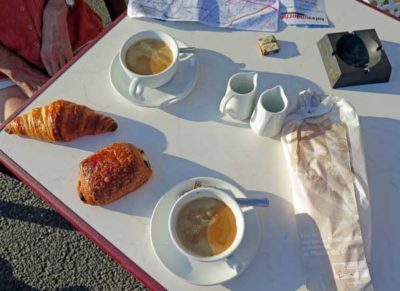
We were the first customers of the day. The tables were on a car park next to the highway, facing the brutal facade of the Super U, but we found it delightful. The newly-risen sun poured onto our backs as we savoured the joys of coffee and pastries.
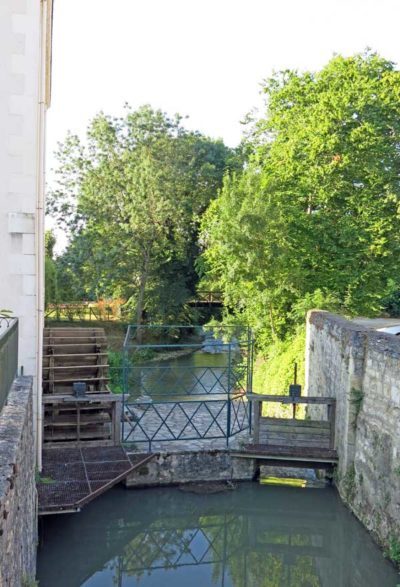
When we set off seriously, we cut through a lane to the Rue des Quatre Vents, near where we had eaten last night, and turned left past a building that had once been a mill, judging by the old water wheel and sluice gate in the stream beside it.
The church which bordered the stream on the other side carried a plaque proclaiming that the fifteen-year-old Joan of Arc had gone to mass here in 1429, on her way to Chinon to speak to the king. She was definitely a well-travelled girl – there are plaques all over this part of France marking her passage.
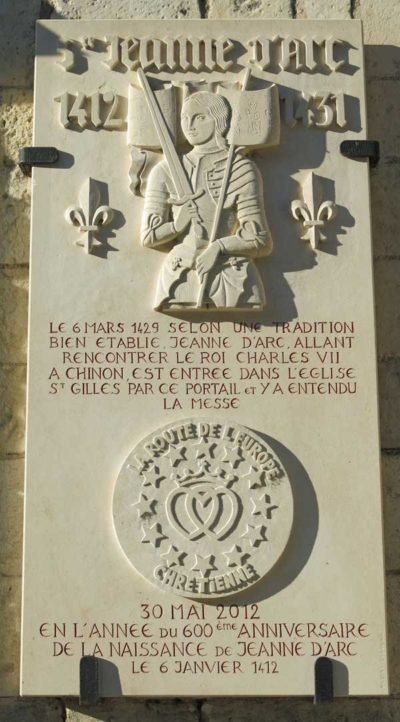
The houses of l’Isle-Bouchard gradually gave way to open fields as we continued along the modest river road, the D8.
The GR48 had taken off on one of its labyrinthine loops and we rejoined it a couple of kilometres out of town via a tarred lane through the vines. There were sunflowers too, and we disturbed a family of ducks as we walked past a farmhouse.
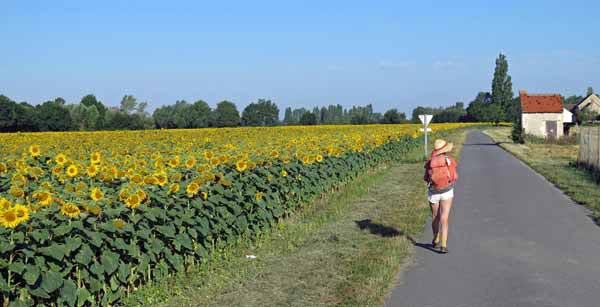
After half an hour we saw a fine cluster of buildings on the vine-clad slope to our right, and the track turned, crossed the D221 and climbed towards it.
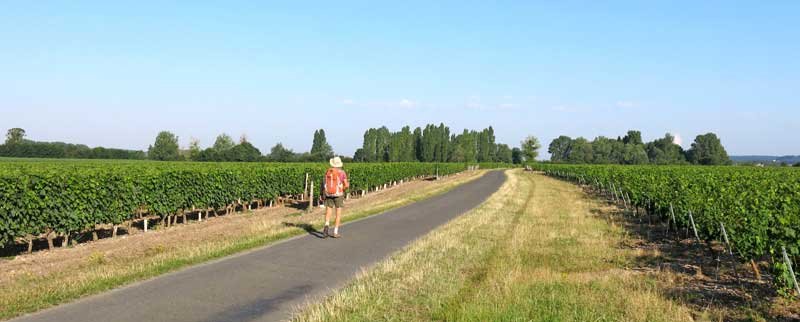
As we expected it was a winery – le Château du Pressoir – with its ribbed carpet of vines stretching up to the wooded hill behind.
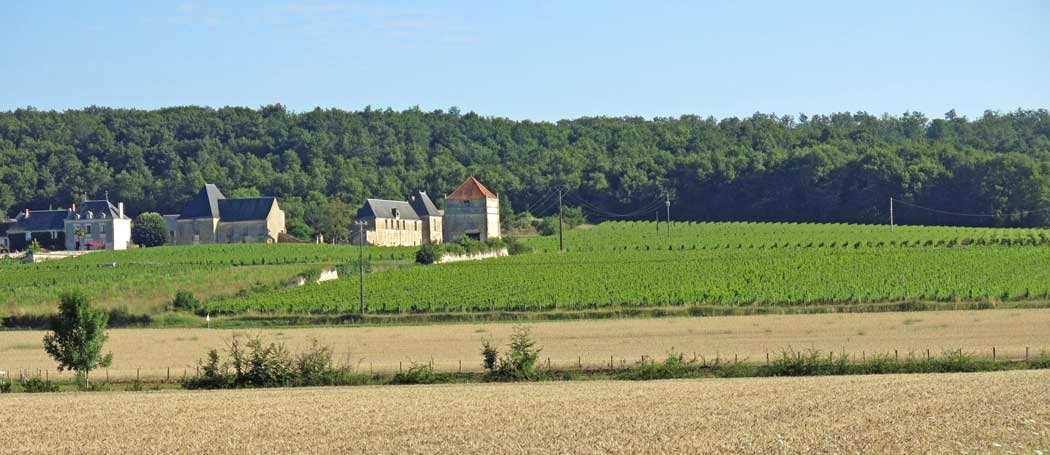

As we ascended beyond the winery, we passed a line of troglodyte houses set into a low cliff, and entered a beautiful deciduous forest, with green sunlight filtering through the leaves.
The bitumen became gravel, then stones and mud, but it was not difficult walking and after two or three kilometres we emerged into vines again and began to come down towards the village of Cravant-les-Côteaux.
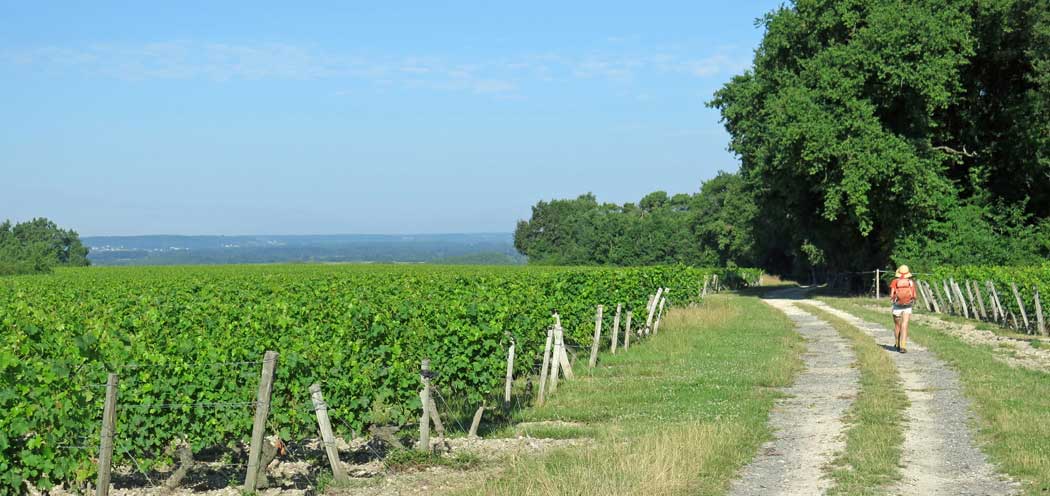
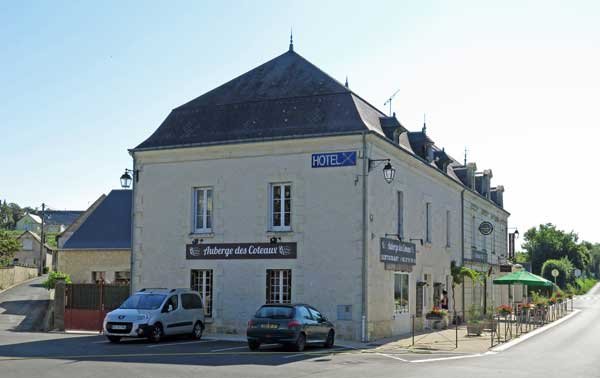
We arrived in the upper part of the village and would have continued along the GR at this height, except that we had hopes of a bar on the main road below, and we were not disappointed.
Just before the church there was a handsome hotel (l’Auberge des Côteaux) with all the attributes of tables, chairs, umbrellas and tubs of flowers, that we love to see.
The interior, when we went to order our coffee, was elegantly set for lunch, but we sat outside.
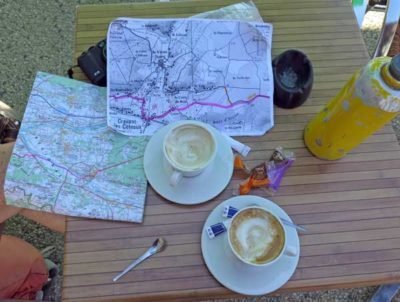
Our plan from here was to return to the GR and follow it into Chinon, but somehow, after we had drunk our coffee, we did not fancy climbing back to the ridge and meandering about in the forest.
It was only eight or nine kilometres by road to Chinon, so we decided to put our heads down and finish it off. The road was quiet and we timed each kilometre as went along, just for something to do, finding that we took eleven minutes per kilometre, which shows how flat and easy the walking was.

Scattered along the road were chalk-white houses great and small, overlooking the flood plain of the Vienne, where crops and pastures grew, and backed by vines on the slope behind.
In due course we passed under the narrow tunnel of the tourist railway and entered the streets of Chinon.
By zig-zagging in a downward direction we quickly reached the riverbank, which was lined by a row of magnificent old plane trees.
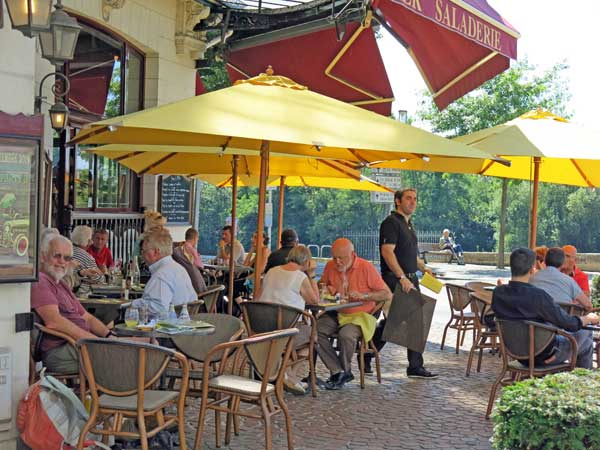
We sat down at a brasserie (La Paix) within sight of the bridge, for a celebratory glass of Orangina. It was 12:30 by then and everybody else was having lunch.
We were acquainted with Chinon from our walk down the Loire in 2006, so we found the camping ground without difficulty, over the bridge and to the right. It was a big, busy place with several ablution blocks and a multitude of caravans and tents.
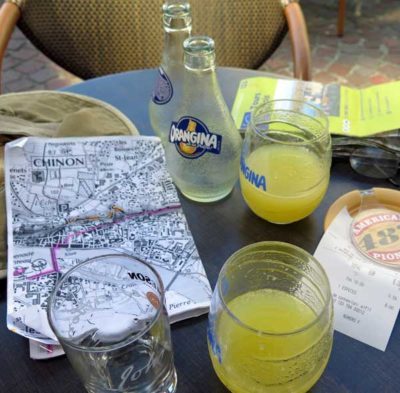
The woman on the desk advised us to find a place at the far end, because there was a circus tonight on the riverbank near the bridge (we had seen it being set up as we passed by). We found a spot in a well-shaded grassy glade, surrounded by other campers and their vans, dogs, children, tables, chairs, banana lounges and portable kitchens.
As the afternoon was hot, we lay around for a while, then ventured out to the bar that we had noticed as we walked past earlier. It had an wide view over the river to the perched ruins of the royal castle, still impressive after four hundred years of neglect. It had been under English control during the twelfth century, but at the time of Joan of Arc’s visit it was occupied by the French king Charles VII.
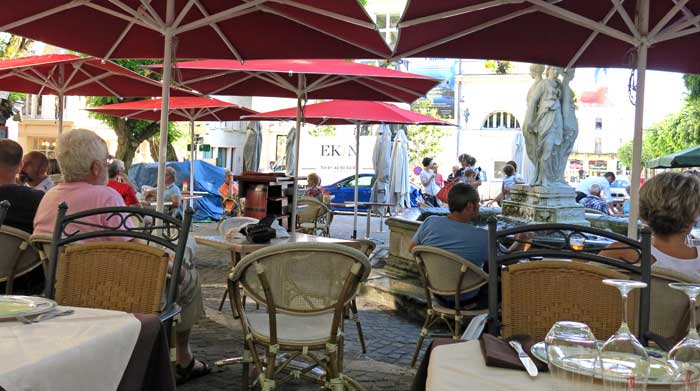
The bar was called the Cyber Bar and it offered an email service, which had become a rarity in France with the rise of smartphones and WiFi, so we were pleased to see it. Having sent off a bulletin, we asked the barman what time he opened in the morning, to which the disappointing answer was 9:30 am.
Luckily we had seen other shops around the corner on the bridge road, and we soon found a bar that opened at 6:15 am (it was also a presse). Opposite this was a boulangerie that opened at 7 am, so we were well satisfied with our prospects for the morning.
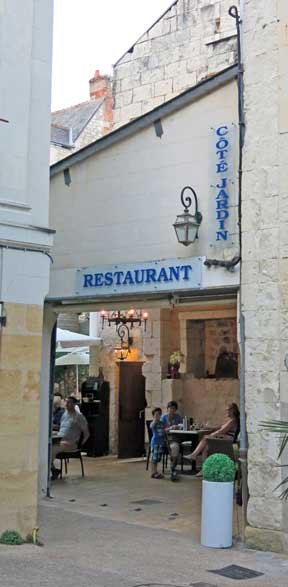
Stepping back over the bridge, we wandered through the lanes and eventually found the leafy square with the fountain where we had eaten on our previous visit (Place Général de Gaulle).
Tables and chairs were crammed together under a continuous canopy of umbrellas, of different colours depending on which café they belonged to. Waiters threaded their way among the tables with trays held aloft.
It was a glorious frenzy of tourism and we remembered with what joy we had come across it down a stairway, after our long walk from Azay-le-Rideau.
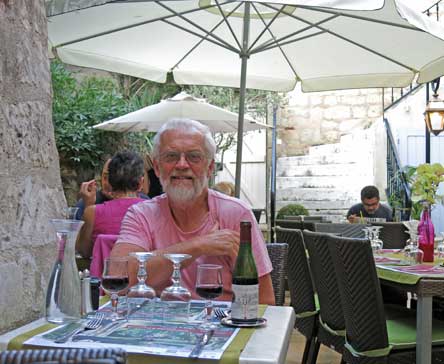
We had apéritifs here, but decided to look around for a different place to dine. The one we chose (Blandineau) was slightly hidden, in a little square at the bend of the Rue Carnot, behind a building.
Once through the entrance we found ourselves in a charming courtyard set against the cliff, with flowers and shrubs cascading down the wall and tables laid under creamy umbrellas. Most of the tables were occupied or reserved, but the waiter managed to find a spare one for us.
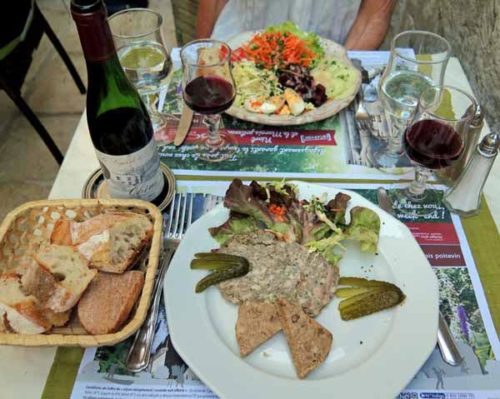
Delighted at this discovery, we ordered a bottle of wine from la Bouchardière, one of the riverside villages that we had walked through this morning.
It was a delicious dark red and a real treat, although the carafe wine that we usually have is surprisingly good too. For the first time in weeks it was warm enough to eat outside without jackets or socks.
The three-course menu was €14 and we began with crudities for me and a plate of terrine for Keith, both of them fine examples of their kind, with which we consumed a whole basket of excellent leathery, holey bread.
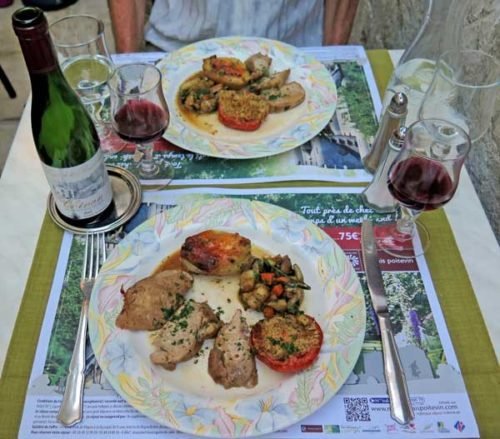
Our second course was filet mignon of pork for us both. This was another classic dish beautifully executed, with ratatouille, roasted tomato and potato gratin.
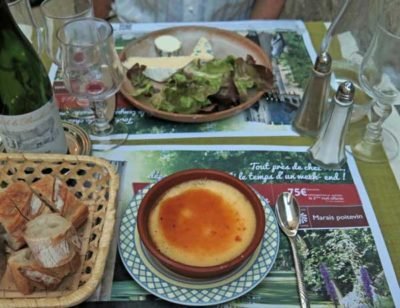
To finish, Keith had crème caramel and I had cheese, which I spirited away for tomorrow’s lunch.
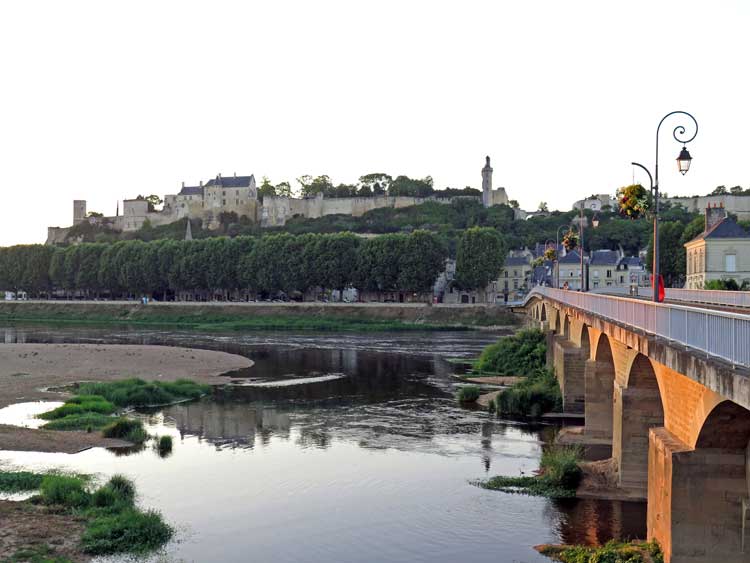
Meanwhile at a long table near us, a tour group of English widows had arrived, with a couple of token widowers amongst them.
Their conversation seemed to consist of a boasting competition about where they had been on previous tours – places like Iran, Morocco and Russia were mentioned, then Burma, Brazil, Antarctica and so on.
We left them to it and strolled happily over the bridge to our little home on the riverbank.
Previous day: Les Ormes to L’Île-Bouchard